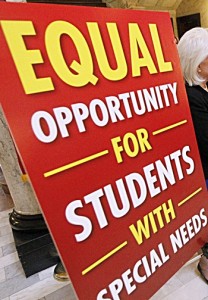Special needs students receive scholarships, Florida’s teachers’ union sues

By William Patrick | Florida Watchdog
TALLAHASSEE, Fla. — Hundreds of special needs students finally have access to an innovative scholarship program offering educational services outside of public schools.
SPECIAL NEEDS: Hundreds of students can now access scholarships designed to support educational services outside of public schools. The Florida teachers’ union, however, is suing to kill the program.
It’s a school choice option for which parents of more than 1,200 students with profound disabilities, such as Down syndrome, cerebral palsy, autism and others, have signed up.
Julie Kleffel, for one, is thrilled.
“The cost of Faith’s speech therapy is about $6,500 a year and none of those costs are covered by insurance,” she recently told an Orlando Fox affiliate. Kleffel’s daughter, Faith, has Down syndrome and is in the first-grade.
“When I got the email saying ‘you’re approved’ I just about jumped out of my skin,” she said.
Faith Kleffel is one of 616 students whose parents were notified last week they could begin using their personal learning accounts, according to Step Up for Students, a school choice nonprofit administering the program.
Hundreds more will follow in the coming weeks.
The scholarships allow for a combination of services and providers, averaging $10,000 per student, and include therapists, specialists, curriculums, technologies and private school classes.
Not everyone is celebrating. The Florida Education Association, the state teachers’ union, is seeing red, as in $18 million in potential funding out the door.
It’s a small amount considering Florida’s K-12 public education budget topped $20 billion this year. But the FEA increasingly sees school choice programs as a mounting threat — perhaps for good reason.
A separate program involving scholarships for the poor now affords 69,000 economically disadvantaged students private school tuition. Those scholarships are based on a donation system where private sector donors receive tax credits for their contributions. No actual tax dollars are used.
The FEA is suing to kill that program.
It’s also suing separately to overturn the legislation that created Personal Learning Scholarship Accounts for Florida’s special needs students. Passed in May, it included a range of items all under the banner of education, including a dropout prevention program, career education, hazing reforms and an expansion of the of the tax credit scholarships.
The FEA says the items are too dissimilar and violate Florida’s constitutional requirement that all items in a given bill be related under a single subject.
“This was a sneaky way for the legislative leaders to enact measures that had already failed,” FEA vice president Joanne McCall said in a statement shortly after the union first filed its lawsuit. “It is an outrage that corporate voucher expansion was tacked into an unrelated bill and slipped into law.”
Once stand-alone provisions, the PSLA and tax credit scholarships were combined after encountering some resistance in the legislative process.
A Tallahassee judge, however, found the union’s lawsuit wanting. The judge dismissed the case last month, ruling that union leaders and a plaintiff teacher had not suffered any harm from poor and disabled students who opted out of their assigned public schools.
The FEA recently refiled its complaint, this time adding three parents of public school students as plaintiffs. If successful, the union can then make the case for more funding to meet vulnerable students’ needs.
Critics say the lawsuit is really about protecting union turf and fighting competition, not necessarily students’ well-being.
As access to options outside of the traditional public school system increase, so has demand. The 13-year-old tax credit scholarship program totals $357 million for the current school year. In 2015-16, it will jump to nearly $450 million. The special needs scholarships will likely grow over time as well.
For many parents of children with unique abilities, that’s a good thing.
An estimated 1,800 special needs students are eligible for the program, and 4,500 applications are in process, according to Step Up for Students.
Only the teachers’ union stands in the way.
“It’s a disappointment that they want to continue the lawsuit,” Patrick Gibbons, spokesman for Step Up for Students, told Watchdog.org after the union refiled its lawsuit. “It’s just disappointing that they’re going to continue to prolong uncertainty for families who want different options that weren’t available until this year.”
“Parents can direct the scholarship dollars in ways they believe will give their kids the most bang for the buck,” said Gibbons, a former teacher.







